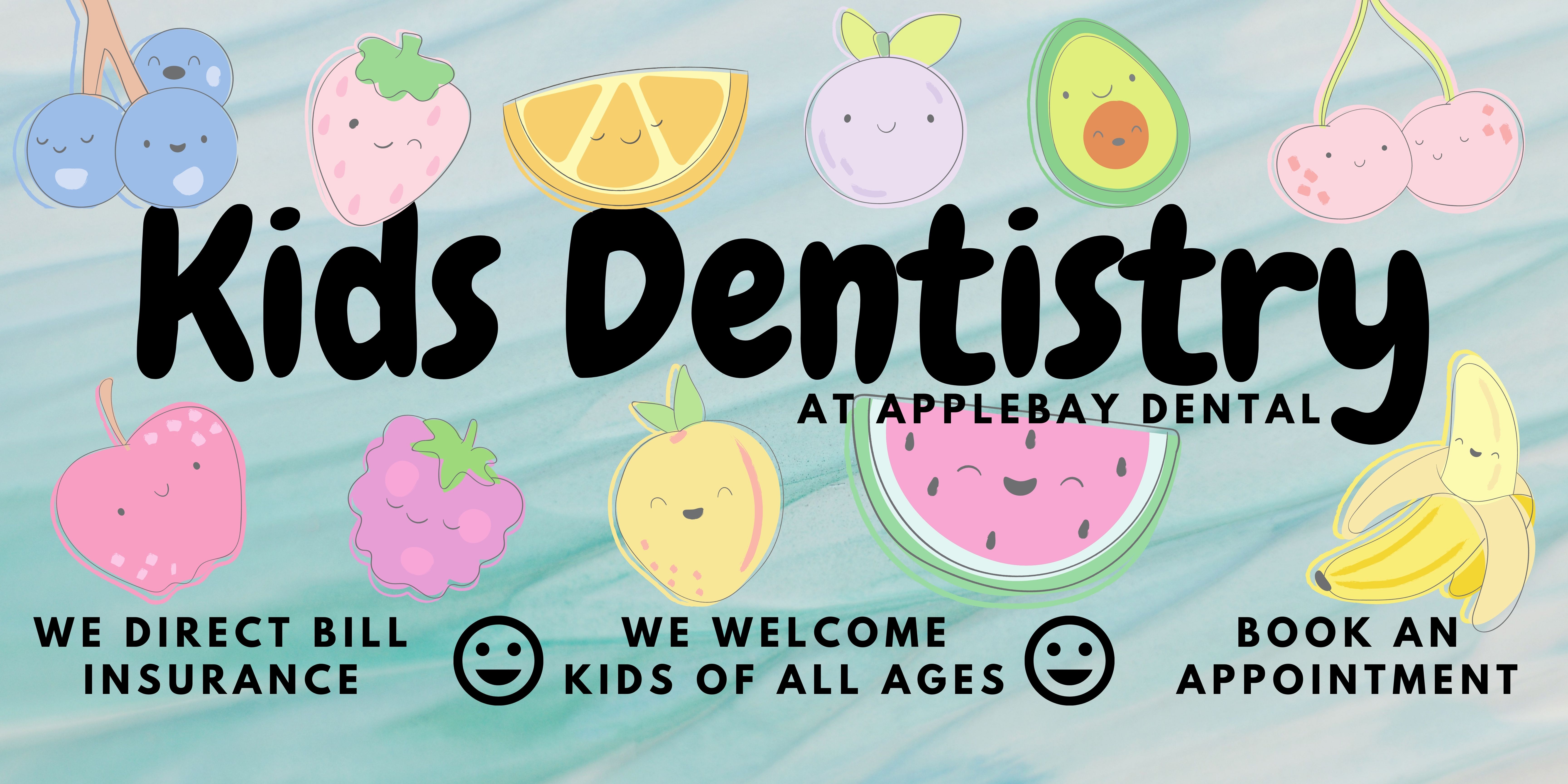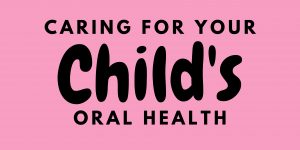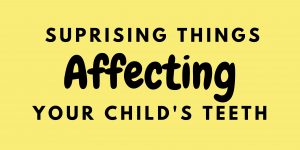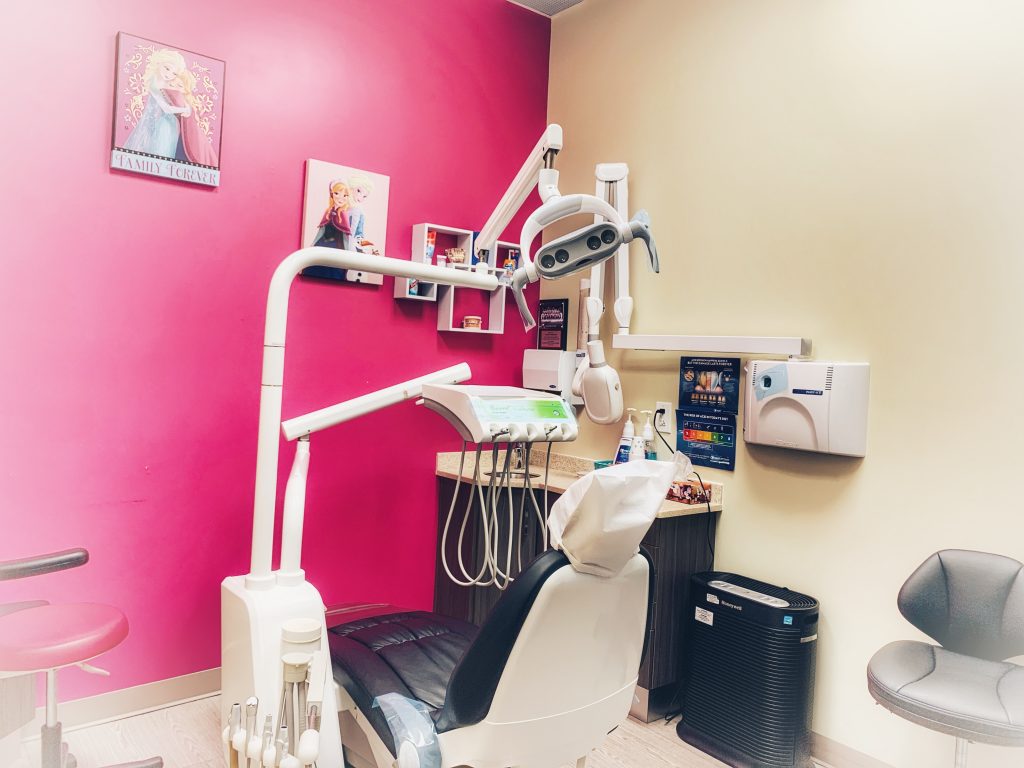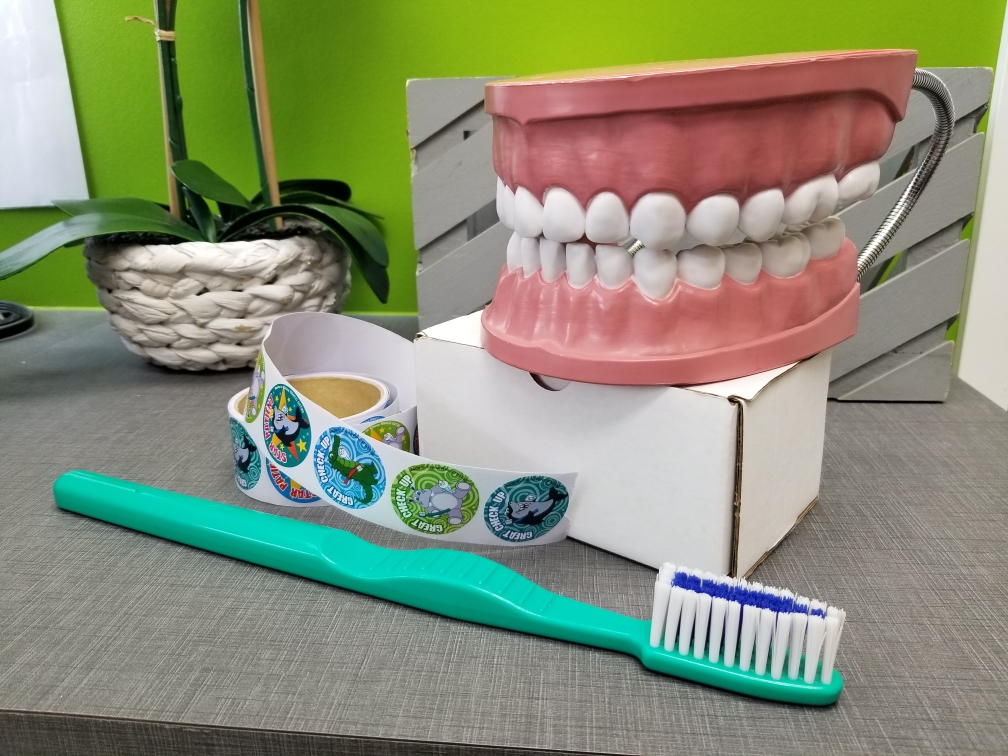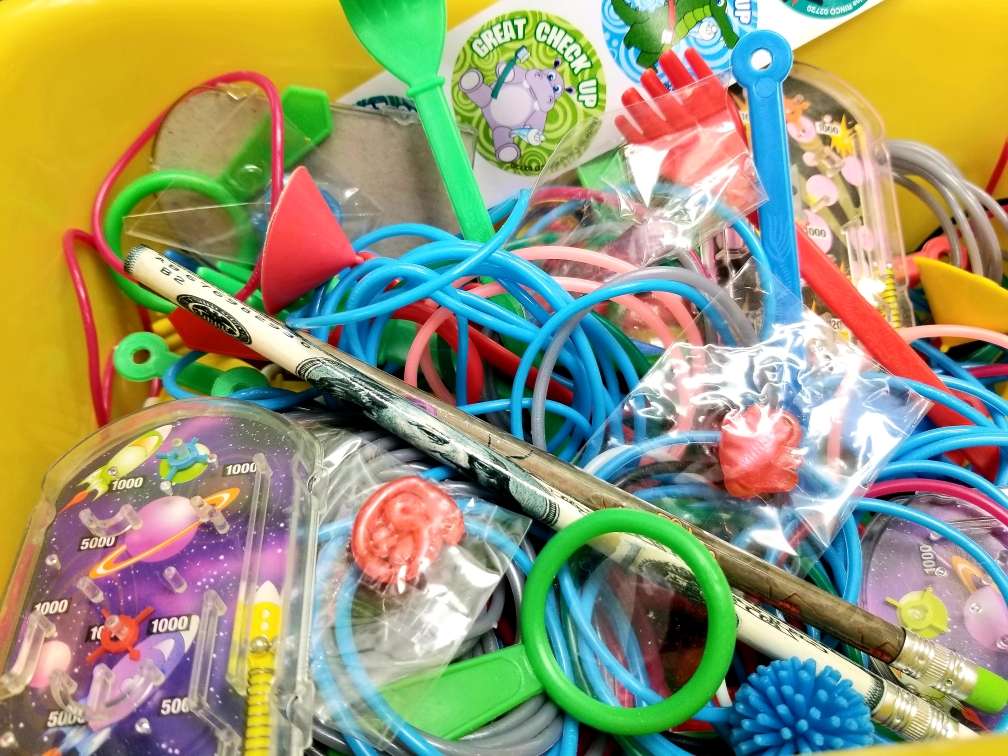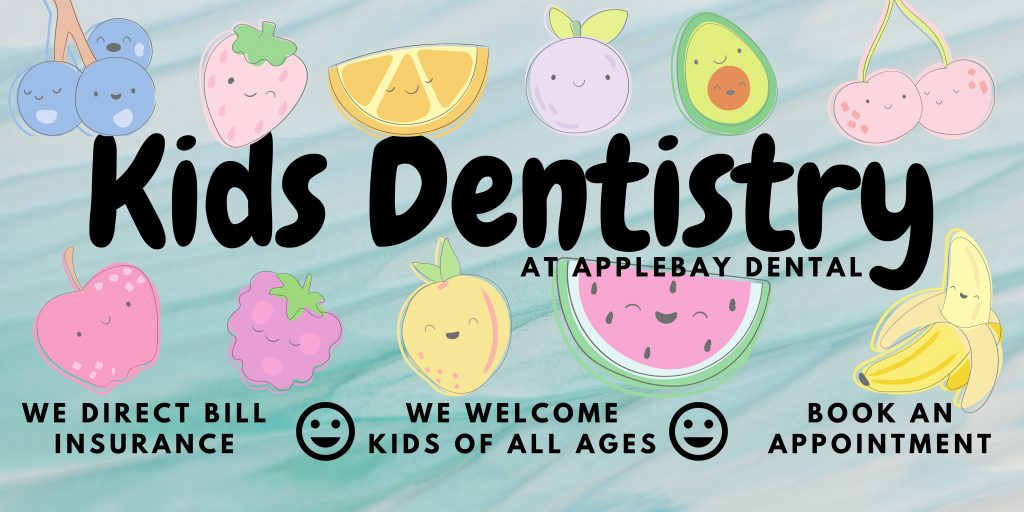Children’s Dentist in Niagara Falls ON
Here at Applebay Family Dental we love being able to help children care for their oral health. We know the importance of caring for your smile and enjoy the opportunity to help.
Preventative care for children:
- Educating parents and kids on how to better care for their teeth at home
- Dental hygiene and examination appointments
- Fluoride Treatments
- Early orthodontic evaluations to ensure teeth are growing in properly
Dental work for children:
Caring for Your Child’s Oral Health
Babies 0-6 months old:
- Wipe your child’s gums with a soft cleaning moist cloth (Please clean your hands prior)
- Wipe starting at the back or the mouth and working toward the front to make sure you get all the leftover milk or formula
- When your child’s first tooth appears use a small soft child’s toothbrush
- Clean your child’s mouth and teeth after each feeding especially at night
- Reduce sugar intake before bed
- Do not dip pacifier into honey or other sweeteners
- Bacteria that cause cavities can transfer from you to your baby to prevent this avoid sharing toothbrushes, sharing utensils, and putting the child’s soother in your mouth
- If you have an concerns with your child teeth contact us
Children 6 months – 3 years old:
- When your child’s first teeth come in use a small soft bristled toothbrush
- Brush your child’s teeth and tongue for 2 min twice daily
- Use children’s toothpaste and teach your child to spit out excess toothpaste to help prepare them to use fluoridated toothpaste
- introduce flossing to make them comfortable
- When your child’s teeth are contacting each other start flossing your child’s teeth daily
- The best liquid to give is water
- Using an open cup
- It is important to book your child in for their first appointment to get them used to coming to the dentist and to make sure everything is going well with their teeth.
- Book their first appointment with us today.
- For more information visit canada.ca
Children 3-6 years old:
- Once children are able to write their name, they are able to brush their teeth by themselves
- It is hard for children to brush well enough to reach all their teeth help your children brush
- Brush for 2 min twice daily
- Brushing your teeth together can help your child learn to brush by watching you
- Introducing songs or games can encourage your child to retain this habit as part of a daily routine
- If your child is no longer swallowing toothpaste you can switch to fluoridated toothpaste to help strengthen their teeth
- Floss your child’s teeth daily
- For more information visit canada.ca
Toothbrush Recommendations:
It is best to get a toothbrush with soft bristles that is the right size for your child’s mouth (sizes are normally on the front top of the package). A toothbrush should replace be replaces every 3 or 4 months or if the bristles get bent or worn down.
Toothpaste Recommendations:
We recommend you use fluoride toothpaste once your child is able to spit out after brushing. Fluoride helps strengthen your child’s teeth which will prevent cavities. However, if a young child is swallowing a lot of tooth paste it may result in fluorosis.
How to Floss:
Step 1: Get a long piece of floss and wrap it around both your middle fingers, leaving about 2 inches between your hands. Use your index finger to guide the floss between the teeth.
Sept 2: Put floss between the teeth and wrap it into a “c” shape. It should wrap around the base of the tooth, where the tooth meets the gum.
Step 3: Be sure you floss both sides of each tooth, and do not forget the backs of the last molars. Move to a new part of the floss as you move from tooth to tooth.
Dental hygiene and examination visits:
It is important to bring your child in for regular dental hygiene and examination visits. We help remove build up that you are unable to reach, show your child where they are missing when brushing, and see if there are cavities starting to form before they get worse. If you would like to schedule an appointment for your child, contact us now.
Fluoride:
Fluoride has been proven to prevent decay/cavities. Since it is not added to the water in the Niagara Region we encourage our patients to do the fluoride varnish in the office and to switch to fluoride toothpaste once your child is able to use toothpaste without swallowing. For more information on the importance of fluoride visit niagararegion.ca.
How and When do Cavities Happen?
Cavities (tooth decay) can happen as soon as your child gets their first tooth. The term dentist use for children who get cavities under 6 years old is early childhood caries. It is important to know what causes cavities and the best ways to prevent them. This section will also go through what to look for and what happens when your child has a cavity.
What Causes Cavities for Children Under 6 years old?
Cavities can be caused by any liquid, that is not water, being left in the mouth after feeding (ie. Breast milk, formula, or juice). When food and drinks are left on your child’s teeth the sugars combine with the bacteria in plaque to create an acid that damages the enamel of a tooth. If left sitting on teeth your child has a greater chance of developing tooth decay. Untreated tooth decay can lead to pain and infection.
How do I Prevent Cavities?
Caring for your child’s oral health at home
- Wipe gums twice a day with a soft, clean cloth (in the morning and evening)
- When teeth come in brush with a soft small bristled toothbrush
- Take the bottle away after your child finishes drinking
- Avoid putting soother in your mouth to clean before putting in your child’s the bacteria can be transferred and cause cavities
Brining you child to the dentist
- You can start brining your child in after their first birthday of after their first tooth is visible. This will help you spot problems earlier.
- We can put on a fluoride varnish to help strengthen the enamel on your child teeth. This is especially important as there is little to no fluoride in the water in the Niagara Region.
How to check your child’s teeth?
Though cavities aren’t always visible you can still try to check your child’s teeth. The video bellow shows how to check your child teeth and what to look for. If you notice stained grooves, chalky or brown stains on your child’s teeth it is important to schedule a visit with your dentist.
What happens when my child has a cavity?
Once you book your child for an appointment we will assess and create a game plan on how to improve your child oral health. We pride ourselves in being good at caring for children and knowing how to make them feel comfortable in the chair. We do offer nitrous oxide aka laughing gas to help them relax while getting treatment completed. With laughing gas children are still aware and awake. For more information feel free to give us a call and we will be happy to answer any questions you have.
Nervous Child? Nitrous Oxide Available.
Nitrous Oxide, more commonly known as Laughing gas, is a mild sedation that can help your child if they are anxious about having dental work completed. To administer the laughing gas we have the child put on a silly colourful nose that will sit on top of their nose. When breathing through their nose they will begin to feel more relaxed. Once the procedure is over the nitrous oxide will wear off fairly quickly.
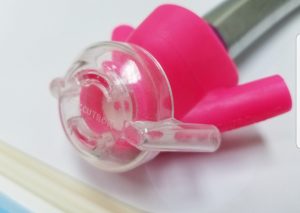
What to Accept at the First Dental Visit?
At your child’s first visit they will get to meet the hygienist and dentist. The dentist will complete a comprehensive exam and go over the following with you:
- Teeth formation and eruption. (ie. crowding)
- Oral Pathology screening
- Speech/tongue ties
- Hygiene habits – what to improve, tips and tricks
- Eating habits
- Growth and development
- Future considerations
Surprising Things Affecting Your Childs Teeth
- Thumb sucking and pacifiers
- Child’s nutrition: Sugary foods and drinks are commonly known to cause cavities. Did you know that sticky food like raisins and crunchy foods like chips can also stick to your child’s teeth and cause cavities? See link for the 7 Worst Foods for Your Child’s teeth.
Our Services
Here at Applebay Family Dental we love being able to help children care for their oral health. We know the importance of caring for your smile and enjoy the opportunity to help.
Preventative care for children:
- Educating parents and kids on how to better care for their teeth at home
- Dental hygiene and examination appointments
- Fluoride Treatments
- Early orthodontic evaluations to ensure teeth are growing in properly
Caring for Your Child’s Oral Health
Babies 0-6 months old:
- Wipe your child’s gums with a soft cleaning moist cloth (Please clean your hands prior)
- Wipe starting at the back or the mouth and working toward the front to make sure you get all the leftover milk or formula
- When your child’s first tooth appears use a small soft child’s toothbrush
- Clean your child’s mouth and teeth after each feeding especially at night
- Reduce sugar intake before bed
- Do not dip pacifier into honey or other sweeteners
- Bacteria that cause cavities can transfer from you to your baby to prevent this avoid sharing toothbrushes, sharing utensils, and putting the child’s soother in your mouth
- If you have an concerns with your child teeth contact us
Children 6 months – 3 years old:
- When your child’s first teeth come in use a small soft bristled toothbrush
- Brush your child’s teeth and tongue for 2 min twice daily
- Use children’s toothpaste and teach your child to spit out excess toothpaste to help prepare them to use fluoridated toothpaste
- introduce flossing to make them comfortable
- When your child’s teeth are contacting each other start flossing your child’s teeth daily
- The best liquid to give is water
- Using an open cup
- It is important to book your child in for their first appointment to get them used to coming to the dentist and to make sure everything is going well with their teeth.
- Book their first appointment with us today.
- For more information visit the canada.ca
Children 3-6 years old:
- Once children are able to write their name, they are able to brush their teeth by themselves
- It is hard for children to brush well enough to reach all their teeth help your children brush
- Brush for 2 min twice daily
- Brushing your teeth together can help your child learn to brush by watching you
- Introducing songs or games can encourage your child to retain this habit as part of a daily routine
- If your child is no longer swallowing toothpaste you can switch to fluoridated toothpaste to help strengthen their teeth
- Floss your child’s teeth daily
- For more information visit the Canadian Government website
Toothbrush Recommendations:
It is best to get a toothbrush with soft bristles that is the right size for your child’s mouth (sizes are normally on the front top of the package). A toothbrush should replace be replaces every 3 or 4 months or if the bristles get bent or worn down.
Toothpaste Recommendations:
We recommend you use fluoride toothpaste once your child is able to spit out after brushing. Fluoride helps strengthen your child’s teeth which will prevent cavities. However, if a young child is swallowing a lot of tooth paste it may result in fluorosis.
How to Floss:
Step 1: Get a long piece of floss and wrap it around both your middle fingers, leaving about 2 inches between your hands. Use your index finger to guide the floss between the teeth.
Sept 2: Put floss between the teeth and wrap it into a “c” shape. It should wrap around the base of the tooth, where the tooth meets the gum.
Step 3: Be sure you floss both sides of each tooth, and do not forget the backs of the last molars. Move to a new part of the floss as you move from tooth to tooth.
Dental hygiene and examination visits:
It is important to bring your child in for regular dental hygiene and examination visits. We help remove build up that you are unable to reach, show your child where they are missing when brushing, and see if there are cavities starting to form before they get worse. If you would like to schedule an appointment for your child, contact us now.
Fluoride:
Fluoride has been proven to prevent decay/cavities. Since it is not added to the water in the Niagara Region we encourage our patients to do the fluoride varnish in the office and to switch to fluoride toothpaste once your child is able to use toothpaste without swallowing. For more information on the importance of fluoride visit niagararegion.ca.
How and When do Cavities Happen?
Cavities (tooth decay) can happen as soon as your child gets their first tooth. The term dentist use for children who get cavities under 6 years old is early childhood caries. It is important to know what causes cavities and the best ways to prevent them. This section will also go through what to look for and what happens when your child has a cavity.
What Causes Cavities for Children Under 6 years old?
Cavities can be caused by any liquid, that is not water, being left in the mouth after feeding (ie. Breast milk, formula, or juice). When food and drinks are left on your child’s teeth the sugars combine with the bacteria in plaque to create an acid that damages the enamel of a tooth. If left sitting on teeth your child has a greater chance of developing tooth decay. Untreated tooth decay can lead to pain and infection.
How do I Prevent Cavities?
Caring for your child’s oral health at home
- Wipe gums twice a day with a soft, clean cloth (in the morning and evening)
- When teeth come in brush with a soft small bristled toothbrush
- Take the bottle away after your child finishes drinking
- Avoid putting soother in your mouth to clean before putting in your child’s the bacteria can be transferred and cause cavities
Brining you child to the dentist
- You can start brining your child in after their first birthday of after their first tooth is visible. This will help you spot problems earlier.
- We can put on a fluoride varnish to help strengthen the enamel on your child teeth. This is especially important as there is little to no fluoride in the water in the Niagara Region.
How to check your child’s teeth?
Though cavities aren’t always visible you can still try to check your child’s teeth. The Canadian Government has made this video to help you check their teeth. If you notice stained grooves, chalky or brown stains on your child’s teeth it is important to schedule a visit with your dentist.
What happens when my child has a cavity?
Once you book your child for an appointment we will assess and create a game plan on how to improve your child oral health. We pride ourselves in being good at caring for children and knowing how to make them feel comfortable in the chair. We do offer nitrous oxide aka laughing gas to help them relax while getting treatment completed. With laughing gas children are still aware and awake. For more information feel free to give us a call and we will be happy to answer any questions you have.
Nervous Child? Nitrous Oxide Available.
Nitrous Oxide, more commonly known as Laughing gas, is a mild sedation that can help your child if they are anxious about having dental work completed. To administer the laughing gas we have the child put on a silly colourful nose that will sit on top of their nose. When breathing through their nose they will begin to feel more relaxed. Once the procedure is over the nitrous oxide will wear off fairly quickly.

What to Accept at the First Dental Visit?
At your child’s first visit they will get to meet the hygienist and dentist. The dentist will complete a comprehensive exam and go over the following with you:
- Teeth formation and eruption. (ie. crowding)
- Oral Pathology screening
- Speech/tongue ties
- Hygiene habits – what to improve, tips and tricks
- Eating habits
- Growth and development
- Future considerations
Surprising Things Affecting Your Childs Teeth
- Thumb sucking and pacifiers
- Child’s nutrition: Sugary foods and drinks are commonly known to cause cavities. Did you know that sticky food like raisins and crunchy foods like chips can also stick to your child’s teeth and cause cavities? See link for the 7 Worst Foods for Your Child’s teeth.


